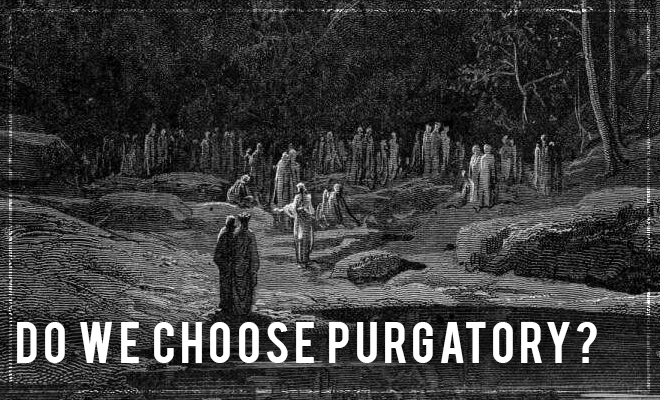Do I have to be a saint to enter into Heaven? What if I am not perfect when I die? Thankfully, God in His unfathomable mercy has provided a “washroom” to cleanse us of the remaining dirt that clings to our soul before walking through the gate of Heaven. This place or “state” is called “Purgatory” and is where many of us will go at the end of our lives here on earth. But is it a place that God sends us? Or do we choose to go to Purgatory?
[featured-image single_newwindow=”false”]
Here is how the Church describes this wonderful place of God’s mercy:
CCC 1030 All who die in God’s grace and friendship, but still imperfectly purified, are indeed assured of their eternal salvation; but after death they undergo purification, so as to achieve the holiness necessary to enter the joy of heaven.
1031 The Church gives the name Purgatory to this final purification of the elect, which is entirely different from the punishment of the damned. The Church formulated her doctrine of faith on Purgatory especially at the Councils of Florence and Trent. The tradition of the Church, by reference to certain texts of Scripture, speaks of a cleansing fire:
- As for certain lesser faults, we must believe that, before the Final Judgment, there is a purifying fire. He who is truth says that whoever utters blasphemy against the Holy Spirit will be pardoned neither in this age nor in the age to come. From this sentence we understand that certain offenses can be forgiven in this age, but certain others in the age to come.
1032 This teaching is also based on the practice of prayer for the dead, already mentioned in Sacred Scripture: “Therefore [Judas Maccabeus] made atonement for the dead, that they might be delivered from their sin.” From the beginning the Church has honored the memory of the dead and offered prayers in suffrage for them, above all the Eucharistic sacrifice, so that, thus purified, they may attain the beatific vision of God. The Church also commends almsgiving, indulgences, and works of penance undertaken on behalf of the dead:
- Let us help and commemorate them. If Job’s sons were purified by their father’s sacrifice, why would we doubt that our offerings for the dead bring them some consolation? Let us not hesitate to help those who have died and to offer our prayers for them.
Essentially, many of us will die with lesser sins on our soul and still have a certain attachment to them. Before we can enter into the joys of Heaven, we must be purified and detached from them.
C.S. Lewis (although not a Catholic) gave a profound (and comical) description of Purgatory that helps us understand why we need it. He wrote in The Great Divorce:
“Our souls demand Purgatory, don’t they? Would it not break the heart if God said to us, ‘It is true, my son, that your breath smells and your rags drip with mud and slime, but we are charitable here and no one will upbraid you with these things, nor draw away from you. Enter into joy?’ Should we not reply, ‘With submission, sir, and if there is no objection, I’d rather be cleansed first.’ ‘It may hurt, you know’—even so, sir.”
Lewis highlights the aspect of choice when it comes to Purgatory. Just as going to Hell is a free choice by a soul who has turned his back on God, Purgatory is a choice made by a soul who sees the attachment to sin that he still possesses.
Think about it. You die and are face-to-face with God. His beauty is glorious and indescribable. Now you look down at yourself and see your sinfulness. You long for Heaven and to be with Him for all eternity, but you know you are not perfect. And so you ask God to be purified first. You ask to go to the “washroom,” to clean yourself up before entering the great Wedding Feast of the Lamb.
Dante in his Divine Comedy, has a similar depiction of Purgatory. He views purgatory as part of a great mountain that has seven levels. These seven levels correspond to the seven deadly sins, which are the roots of our sins. In each level, a soul purifies itself and its attachment to each sin. Here Dante describes a similar process to what C.S. Lewis recalls. Dante writes,
“And of that second kingdom will I sing
Wherein the human spirit doth purge itself,
And to ascend to heaven becometh worthy”
The entire process is voluntary and the purging is done by the individual.
Purgatory is a hopeful place, where we are purified not for all eternity, but for a specific amount of “time” (even though there is no earthly time in the afterlife) before entering the gates of Heaven. It is an expectant joy mixed with grief caused by sin. You want and desire to be united with God, but you know you can not be fully united until you are cleansed of your sins.
When it comes to the afterlife, we are confronted not with a vengeful God who “sends” us to Hell or Purgatory because He somehow enjoys seeing us suffer. Rather, we see a God who is Love and Beauty Itself and then we see ourselves, who have freely chosen to lead sinful lives. Some of us have chosen to live entirely divorced from God, while many of us have chosen to be attached to certain little sins.
Purgatory is a great gift given to us for the sake of our souls. It allows us to be cleansed and pure, ready to embrace the Beatific Vision for all eternity.
Read the Entire Series

